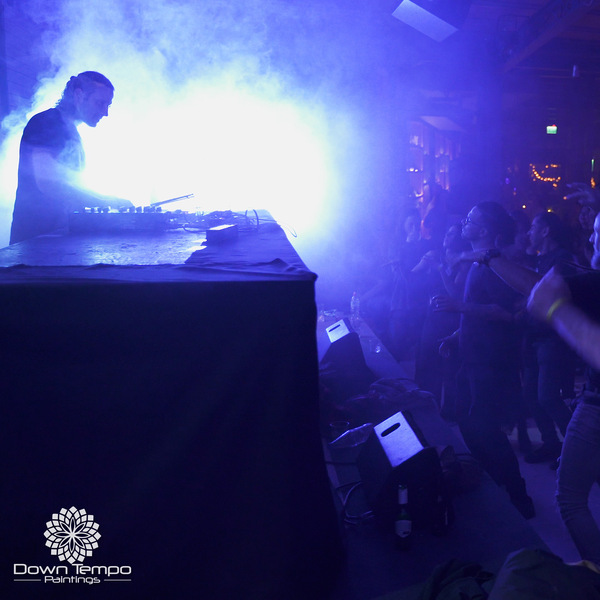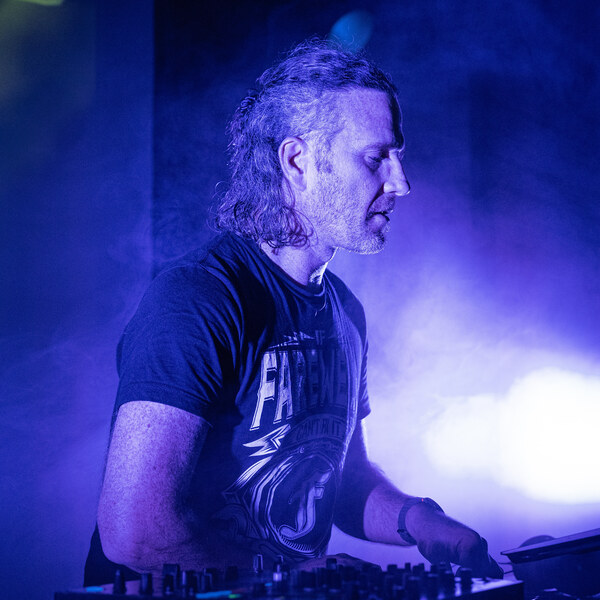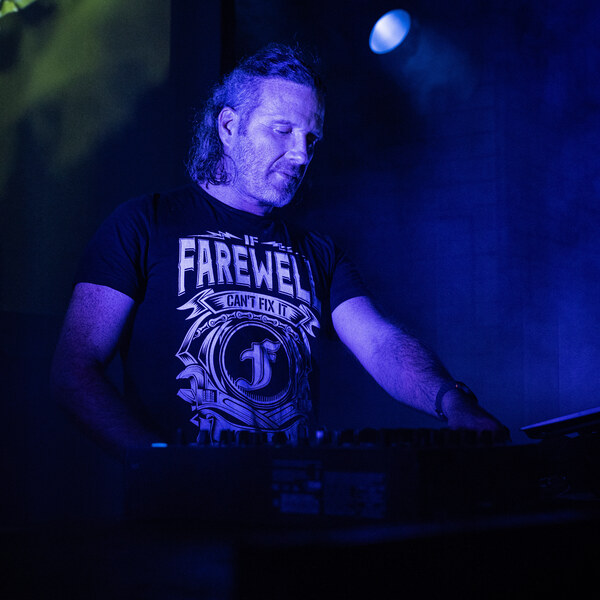Between psychedelic trance, ambient, and world music. Asura is Charles Farewell, who has been creating a rich variety of sound for nearly 30 years with several outstanding albums. The project has also seen contributions from Vincent Villius, Christopher Maze, and Alex Ackerman.
Monotonous melancholic lyrics, symphonic waves, fast and slow rhythms, heavy or throbbing, liturgical songs, the project Asura introduces a certain solemn vision of the world.
We are fortunate to have the opportunity to speak with him.
Interview by the psybient.org team on 03/01/25.
Images by Down Tempo Paintings.
Hi Charles, how are you doing? Thank you so much for spending some time with us.
Hi Iurii! First of all, I wish for you and your readers an happy new year, full of love, achievement, inspiration and, of course, music ;) Everything is fine under my sun. Hope it’s the same for everybody around here. Thank you to let me this space to give some infos and news about my music.
Are you currently in Lyon? How does the upcoming winter season look there?
I live near Lyon, yes, in the countryside. Winter is harder than last year, but nothing unbearable.
Asura originated in 1996, but let’s rewind a bit. What inspired you to start creating music, and how has your creative process evolved over the years?
Back in those days, in 1994, I met Vincent Villuis at University, who was too student in modern litterature. He had a little home studio, with AKAI S01 sampler, korg wavetation, juno 106 and cakewalk. He heard some kind of sound editing I have done on windows 3.1 music software (I don’t remember the name), found it good, and proposed me to join him and compose with him. We merged our musical tastes, around electronic music, trance, industrial, polyphonic (Arvo Part, paghjella) and big names of Berlin School and Space music of the 70’s.
Over the years, the Asura project has undergone evolution with various artists involved. Could you share some insights into that path?
Asura was created in 1996 by Vince and me. The duo became a trio in 1998 with the arrival of Christopher Maze.
In 2001, Vincent left the band to concentrate on his new solo project, AES Dana. Then Alex Ackerman joined the band. We released Lost Eden, the second Asura in 2002 (first edition), as a trio. And, finally, Asura became a solo project in 2005, twenty years ago, with only me, myself and I ;)
Can you describe your current studio setup and the tools or software you use most often? How do you balance the technical and emotional aspects of music production?
Very compact I would say. My daw is cubase 14, surrounded by 2 screens, Adam S3X-V monitors, SENNHEISER HD600/650 and AKG N90Q, and a Roland OCTA-CAPTURE soundcard. Most of the instruments I use are virtual now, controlled by my komplete S61 MKII master keyboard, and helped by a muscled PC. When it comes to hardware, I use FATAR SL 990 PRO for a real piano heavy touch, and korg n5 to cook some “Code Eternity” revival feelings.
Are there any upcoming projects or musical experiments you’re especially excited about?
I am onto composition of my next album, the 7th. And preparing to an uptempo album under my psytrance moniker, DHEEVA, in collaboration with my trance pair Lestesie. I am also currently working on two remixes from 2 artists I love, musically and humanly speaking. I would like also to release a totally ambient/space album, but it won’t be immediately.

As someone deeply involved in ambient music, how do you think the genre is evolving?
The same way as music is evolving in general. Technology is constantly pushing the limits of composition, as far as you don’t lose the deep meaning of creation: discovering, feeling, proposing your own vision of the world, being surprised, driven in new directions. I think that ambient music spectrum is large. You have many sub styles, such as psybient, drone, even postrock influences that can make this genre richer. Is it the case in facts? I don’t know. this is just the way I would like it to be. All the tools we have in our possession should favor diversity whatever the music kinds you practice.
Do you find certain environments or landscapes particularly inspiring for your music?
I live in countryside near Lyon, between birds, chicken and moles. A fully serene environment to make introspection and focus on composition without disruption. Composing too by night in my beautiful and mystical island of Corsica.
What’s been your most memorable festival experience, either as a performer or attendee?
I would say some gigs at Ozora in the early 2010’s, a particular night in a forest near Kiev with the Ultimae crew in 2011 if I remember well, some great moments in Greece too, even lately at Gazarte in Athens. Or for the new year eve in 2015 in Quebec, under the snow… Ok, so just one… Ozora 2010. I was closing the festival, so I guess that’s why there was a very special ambience. I rarely felt such connection with the public, and too with a third party somewhere in the air, invisible, among us, really supernatural. And believe me, I had only drank two beers ahaha It gives me gossebumps each time I remember those moments.
What advice would you give to aspiring musicians looking to make their mark in the psybient or ambient scene?
The most important thing, be YOU. It means authentic. You can be inspired by many musicians, but don’t copy them. Have confidence in yourself. The artists who “made their mark” as you said, did it because they had a personal vision, an unique way of express their feelings through music. And, for reaching this point, you have to experiment. It won’t, of course, ensure success, but music can’t be a recipe, we have to accept it. The creative process is meaningful above all when it outruns us. That’s where the magic lies often, where you didn’t expect to find it.
When you’re not making music, what hobbies or activities help you relax and recharge?
Spending times with my nearest, namely my family and my friends, it’s not very original! Recently I acquired a VR headset, it’s a good way to escape softly reality while remaining anchored to the floor. And I try to run occassionaly, cause I am now 50 and must maintain a little bit the old machine :)
Would you like to send a message to the psybient.org community?
Thank you so much for your unwavering support in our music, throughout the years.
Keep on listening, learning, feeling, sharing. And, above all, keep the flame and keep the Y, always!

Questions from readers:
Why did Asura and Aes Dana break up? Is there any chance for a collaboration in the future?
It was a very long time ago in 2001, as I said above, just after Code Eternity, our first album. Vince had the will to concentrate on his recently created project AES Dana, and wanted to give another color to his music, not compatible at this time with what we wanted to create with the Asura third member, Christopher Maze, and me. Concerning a possible collaboration in the future, that’s a question (very) often asked. It’s possible, as far as whe find a true appeal, musical alignment, time. Who knows? ;)
Are there any particular artists or albums that inspire you or have influenced your work significantly?
In the very beginning of the project, we were mostly inspired by big names of the golden age of space music, such as Tangerine Dream and Klaus Schulze, or Michael Stearns. Vince was a big fan of Robert Rich and Steve Roach, so I was of Vangelis and Jean-Michel Jarre, if we must quote names. Brian Eno too for both of us. Concerning psychedelic music, I would say that Banco de Gaia’s last train to Lhassa and Astral Projection’s Ambient Galaxy gave the guide lines for our future first album.
Also, What’s the meaning of the Asura name?
In Hinduism, the Asuras are a group of power-seeking deities, sometimes referred to as demons. They were opposed to the devas. Both groups are children of Kashyapa.The negative character of the asura in Hinduism seems to have evolved over time. In general, the earliest texts have the asuras presiding over moral and social phenomena and the devas presiding over natural phenomena.
In Zoroastrianism, the term asura is linguistically related to the ahuras of Zoroastrianism, but with an inverted morality. Thus, while in Vedic religion the asuras are demonic, in Zoroastrianism, the ahuras are benign. This inversion also applies to the other class of immortals: where the Vedic devas are benevolent, the Zoroastrian daevas are malevolent.
If we take a more occidental point of view, an Asura is the equivalent of a fallen angel, who was sent away from Paradise by the Supreme God, his father, the Mahadeva, because of his compassion for the suffering humans down Earth. He is condamned to chase his love eternally with absolutely no hope to regain paradise.
That’s why we chose this name. For his ambivalence, not totally good, not totally bad. Like a human. The Asuras are very human deity, in fact. The romantic meaning was too one of the main reasons to take this moniker.
Thanks a lot for sharing your words and experience. We will continue enjoying your inspiring music and looking forward to your new album. A big hug!
Cheers from here and thanks a lot too Iurii!
Listen and follow Asura:


![[Interview] with Birds of Paradise](https://www.psybient.org/love/wp-content/uploads/Birds-in-the-Studio.jpg)



